#where's your empathy. where's your compassion. where's your humanity
Explore tagged Tumblr posts
Text
i haven't prayed in years and it doesn't feel right anymore so i won't pray but still i hope with all my heart people in Palestine and Palestinians especially will survive the atrocities committed against them and get to experience freedom and safety
#i'm watching the al jazeera on their website and i'm refreshing the news just hoping people survive this attack#i cannot fathom the cruelty that drives people to lead those attacks on civilians#where's your empathy. where's your compassion. where's your humanity#poland prides herself in her ability to survive and continue existing across the pages of history no matter the odds#and seeing my country turn from Palestine now makes me want to tear my hair out#i'm kinda drunk after everything that happened to me and in the news today so i'm sorry if i don't make any sense#it's almost 2 am but i'm afraid to fall asleep bc i could wake up to terrible news so i'd rather stay awake and aware#not tagging bc i don't want to clog up the tags#please ignore me i just felt like i need to tell all this to someone but i'm alone so this blog is the best option for me rn#sorry i'm not doing too good rn
1 note
·
View note
Text
If the idea of having empathy and compassion for fellow human beings has you raging because of where those human beings happened to be born or to live then there is something fundamentally broken in your soul.
294 notes
·
View notes
Text
Gojo cares a lot, actually
Perspective and empathy in Jujutsu Kaisen
Once again, I see accusations that Gojo only cared about people in relation to their strength. I can't believe that 236 and 261 haven't put this idea to bed already, but let's go over it again for the class. Here are some thoughts on the importance of perspective and empathy in JJK. Spoilers for chapter 266 ahead!
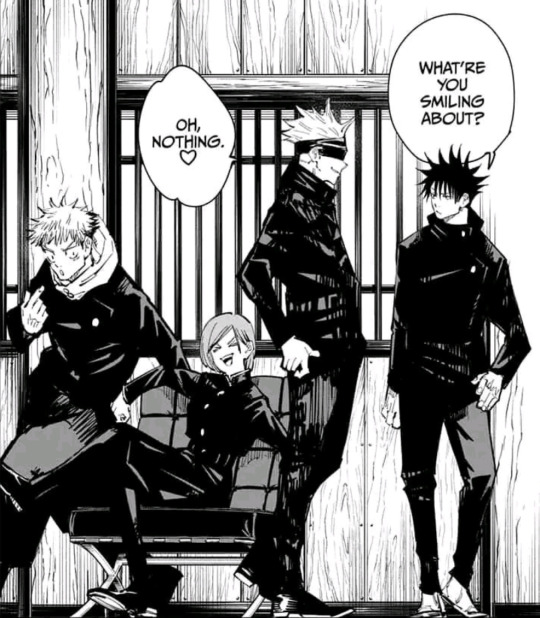
In 236, Gojo tells Geto he loves everyone. This single line, direct from the man's mouth, should be enough. However, moments later, Nanami says, "You never cared about protecting people". So why do some readers only take one of these perspectives at face value?
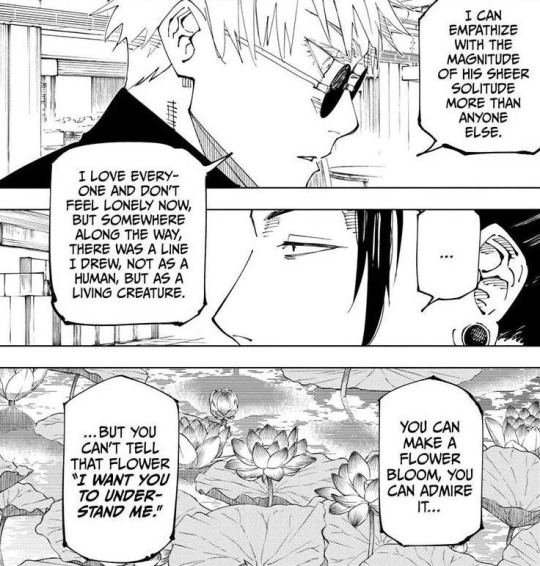
Perspective matters in JJK. Often, characters and even the narrator state things that are only true from their perspective in a given moment. What you choose to believe says more about you than it does about them — an idea I explored in my analysis of 236.
This is particularly important when it comes to Gojo and Megumi, because the moment they meet is the only (?) scene in the whole of JJK that we get to see from two perspectives.
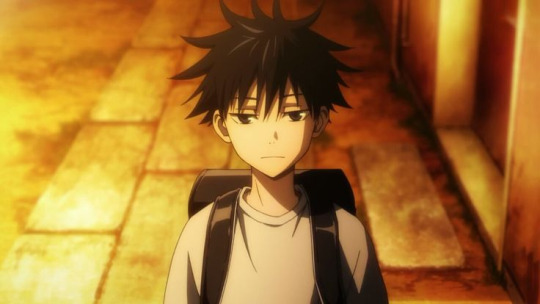

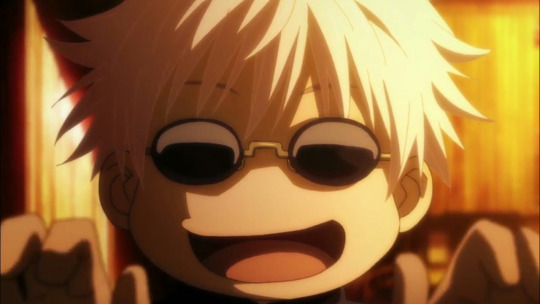
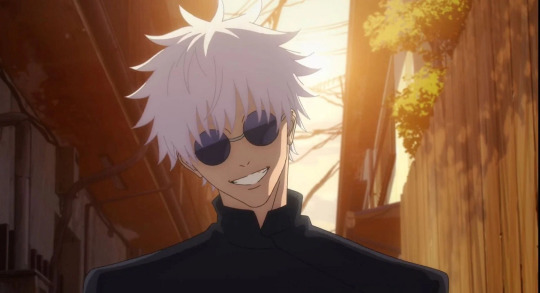
The second time, the reader understands the emotional weight of it for Gojo — but Megumi doesn't. He's kept in the dark, so of course he thinks about their meeting in different terms.
Once again, whose perspective are we going to take at face value? From Megumi's point of view, he wasn't offered a choice. From Gojo's point of view, he extended to a child the little agency available to him.
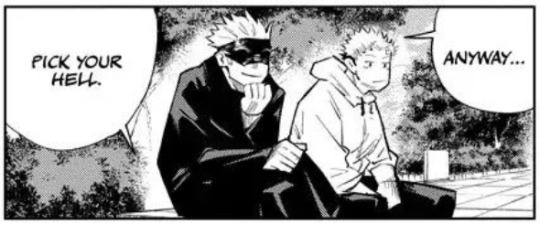
Offering a choice is something Gojo does consistently throughout JJK — pick your hell. It's one of the ways he shows care for others that goes unrecognised, so it's ironic that readers and characters alike misinterpret it for a lack of empathy. However, this is no coincidence.
For much of the series, Gege keeps Gojo at a narrative distance from the reader. Most of what we know about Gojo comes from what other characters tell us, and our view of him is therefore coloured by their perspective.
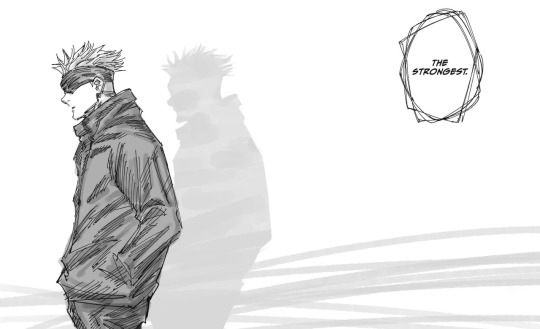
However, while Gojo laments the distance between himself and others, he fails to recognise that he's the one maintaining it — and not because of his strength or his technique. He has admirable goals, but he chooses to work towards them alone.
There are many occasions where characters reach for Gojo, but he refuses to let them past his metaphorical Infinity out of a sense of duty and perhaps misplaced belief that he alone can or should bear this heavy burden.
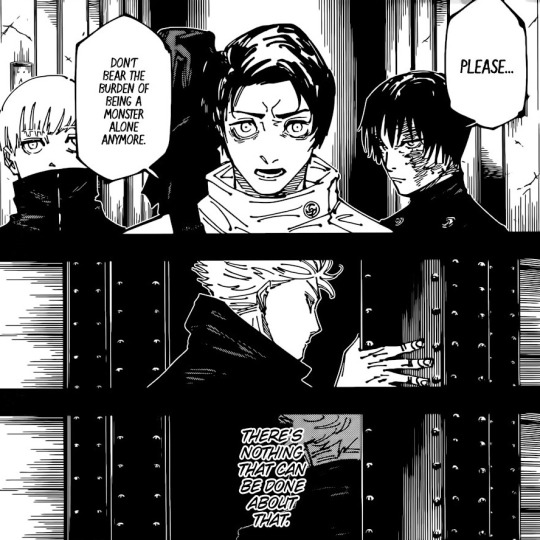
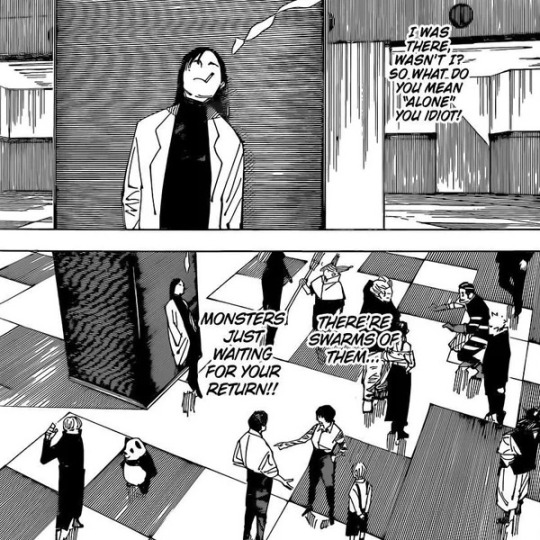
All of Gojo's actions are about preserving the humanity of others at the expense of his own. That's precisely why he chooses to become the "monster" alone. In this way, Gojo is flawed but he isn't uncaring. Again, it's a matter of perspective.
Gojo sees strength as the solution because it's all he's ever known. However, recognising the strength of others doesn't mean that's all he sees — because Gojo knows that dehumanisation acutely. What's more, 261 also suggests he thinks of "strength" in different terms to others.
When they meet, Gojo tells Megumi not to get left behind. However, he later says he was "left behind" when Geto defected. We know Gojo's physical strength eclipsed Geto's, yet Gojo only refers to himself as "the strongest" alone after Geto dies.
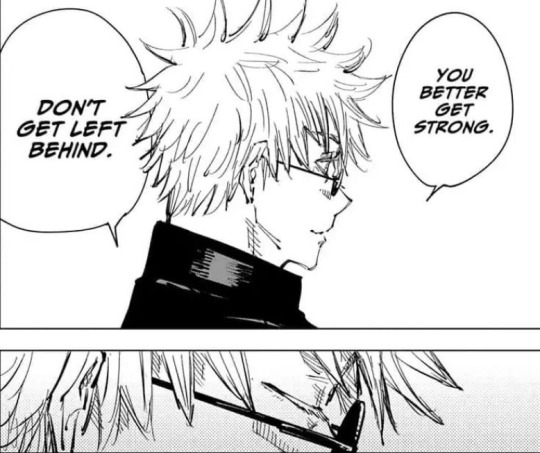
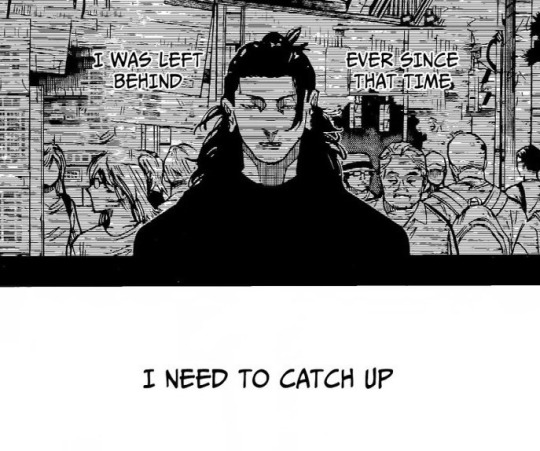
Before that point, there's nothing in the text to suggest that Gojo ever stopped thinking of the pair of them as "the strongest" — as a unit, as a duo. This suggests that strength, for Gojo, is something much more intangible, much more sympathetic, and much more human too.
What do the strongest characters in JJK all have in common? Indomitable will, courage in their convictions, an overwhelming sense of self. Looking at strength through this lens shines a new light on Gojo's goal of raising "strong" allies.
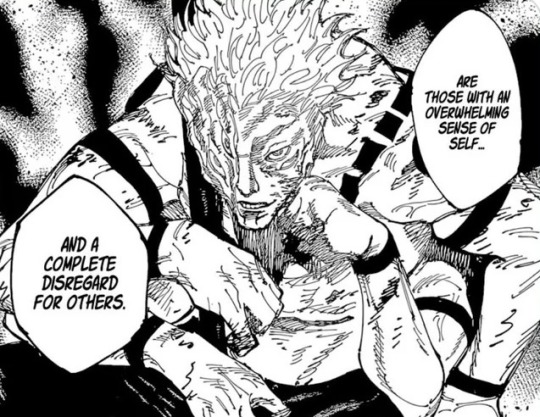
When he forces a third option in Shibuya, Gojo proves that strength doesn't have to come at the expense of compassion. In the later chapters of the Shinjuku Showdown arc, Yuta, Yuji, and the rest of Gojo's allies reinforce that idea ten times over, and I have every belief that Megumi will soon do the same.
To suggest Gojo only saved Megumi for his technique is unfair when he has consistently proven himself committed to protecting the futures of others, even "weak" non-sorcerers who have nothing to offer him. Once again, it's all a matter of perspective.
Gojo's way of caring is still caring, even if it doesn't look familiar to you. His only flaw was closing himself off from others and choosing to care from afar. However, just like Gojo never stopped reaching for Geto after he left, Gojo's allies never stopped reaching for him.
There's a phrase we use to describe looking at things from another perspective: putting yourself in someone else's shoes. I think it's very telling that Gojo's allies have taken that literally — Yuta by stepping into his skin, and Yuji by standing in his place in 266.
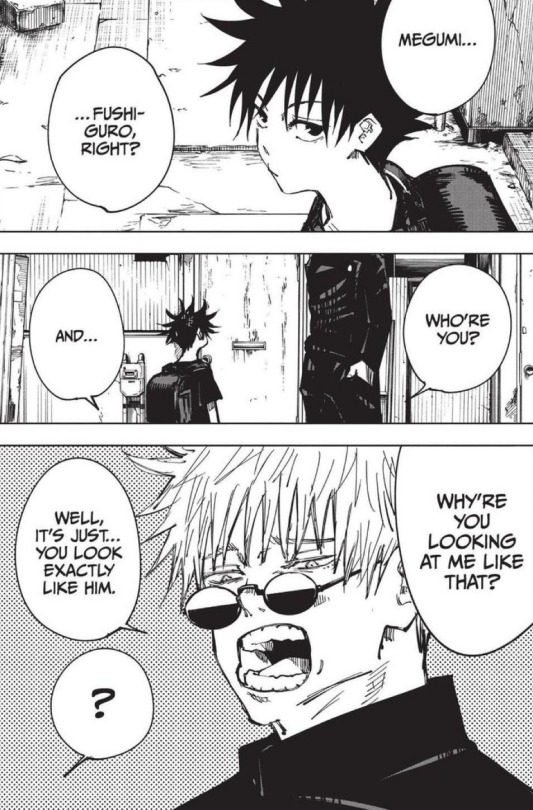
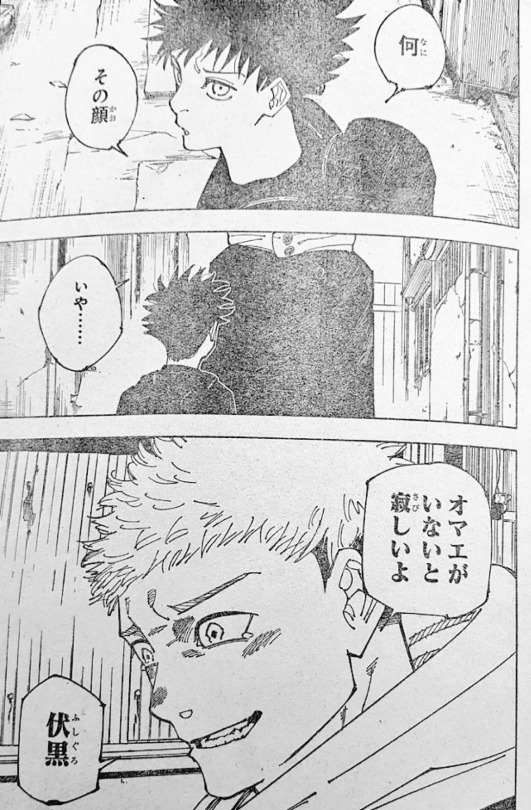
TL;DR: Gojo cares a lot, actually. If Gojo talking about his innermost feelings can't make you empathise, and the students he supposedly "doesn't care about" recognising his burdens can't make you empathise?
Well, that says far more about you than it does about him.
Come read my fics about this!
In His Shadow explores the ways Gojo keeps his distance from Megumi, who isn't equipped with the tools he needs to reach him but finds his own ways to show he cares, born from ten years of history together.
Rivers Crossed, Mountains Scaled explores Gojo and Megumi's relationship through the vehicle of SatoSugu — why Gojo took him in, whether Gojo really gave him a choice, how Gojo sees him.
Hope you enjoyed the post! I love you, Gege Akutami ♥️
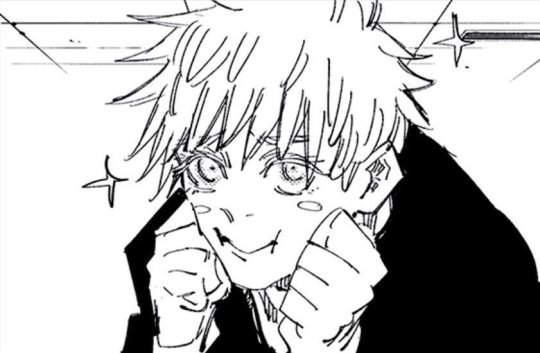
#jujutsu kaisen#jjk#jjk 266#呪術廻戦#gojo satoru#fushiguro megumi#jjk spoilers#jjk manga spoilers#jujutsu kaisen spoilers#jjk meta#jjk analysis#jujutsu kaisen meta#jujutsu kaisen analysis#glo's writing#glo's analysis#fushiglow
551 notes
·
View notes
Text
The Recruiter x Fem!Reader [PART 1]
cw: gun play, blood kink, forced oral (f receiving), forced kissing, non-consensual touching, sadism, dead dove: do not eat, non-consensual masturbation, stalking
!!: the tags correspond to the second part, but I'm leaving them here just in case
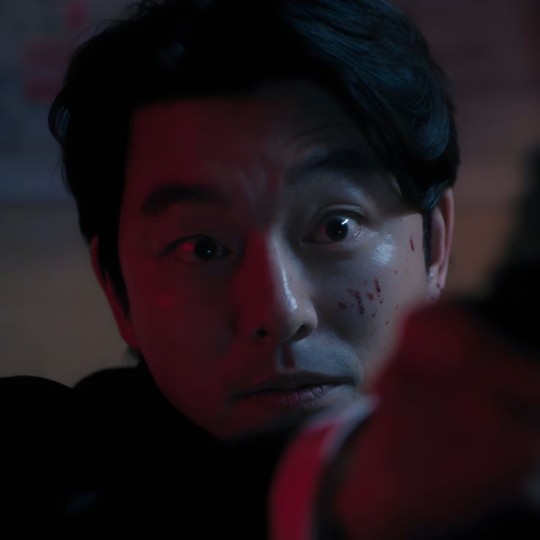
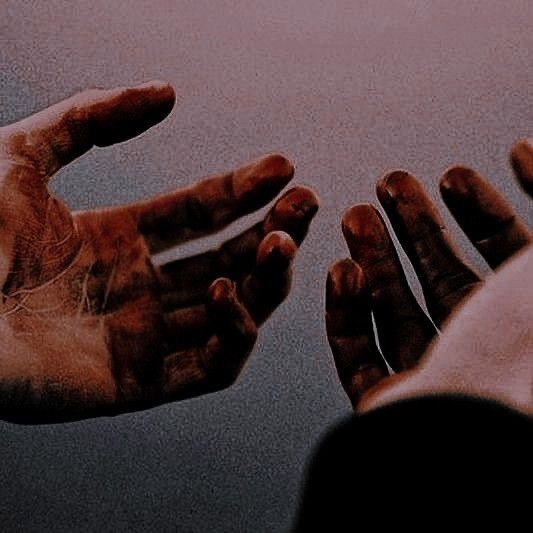
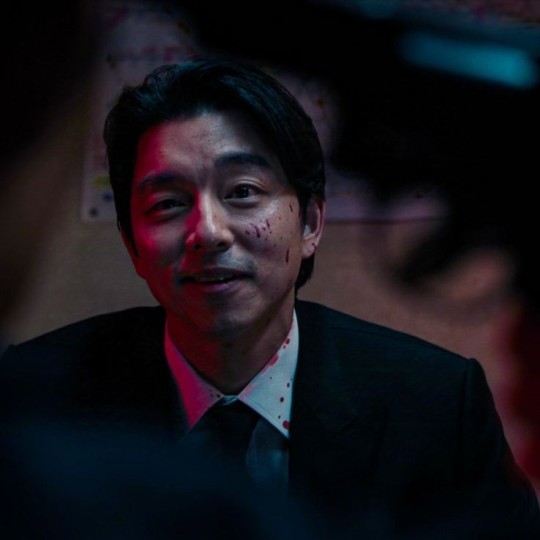
I'm going to die tomorrow, and if you find this, it's probably too late. It's embarrassing that I don't know you, and you don't know me, but I hope you can have some empathy for my fate; and maybe somewhere where I can be happy, that will help me have some compassion for my next life.
.
.
.
.
The tiny letter you had left as a pitiful legacy had been left behind; on one of those stone benches in the enclosed park, where the tramps used to go to sleep. You thought that many of them would pay no attention to it, and lost sighs during each word would be of no use, but you did it anyway: you leaned the paper in a corner, pressed by a stone so that the wind would not blow it away. Your letter was going to be read; at least the first few words. That was enough.
Your death was going to be disastrous, that was certain. You had chosen one of the highest bridges, the one over one of the busiest avenues. When it was three or four o'clock in the morning you were going to jump off it; your body would crash to the asphalt, interrupting traffic, and your brains would paint the pedestrian crossing where a group of police and assigned professionals would soon come to inspect your remains. Quite dramatic, to be sure, but memorable.
You were still a bit sad to die like that; with so many people watching. That was what you wanted most of all: to die. It was as simple as that. But who could assure you that no one would record you? Who would forget you at the end of the year? People really die when they are forgotten, because what is man but the result of a social construction; and if at least one human being could have a fragment of you in their memory, engraved like your flesh against the rough ground at the dry impact of the fall, something so simple and brutal, how could you really disappear? You were to be the icon of an ephemeral internet star; some pitiful soul representative of the underdogs, those unable to do what you would do in a couple of hours.
You didn't want your soul locked up in limbo, in the same world where you could no longer find your spouse. You wanted to go with them.
You felt it deep inside you; in that corner so easily mistaken for the heart. You knew that they had died long ago, after they had returned and disappeared again to play those infamous games they talked so much about. Big money, they said; that there was a big prize for whoever could make it to the finish line. Many people in one place, like rats, and prey to some strangers with morbid ideas.
True or not, your spouse had no longer returned home. Dead or missing with the supposed prize. It didn't matter to you; you had spent every last penny to pay off your debts. Debts that were not really yours, but no one else's either. It was just you, the bridge... and the stranger in the suit underneath.
Someone in the middle of the street.
A car or two honked their horns from time to time as they passed by the man. He kept looking up at you. You couldn't quite make out his features, but you'd bet it could be grief judging by his free hand raised in the air; between his fingers a piece of paper that suddenly reminded you of your letter. You felt ashamed again.
‘’It's not safe to stand on the edge of such a high bridge!‘’ he shouted. You could hear a smile in his voice.
You didn't answer, but as soon as you saw him head for the stairs leading to the bridge, you jumped down to make a dash for the other end. Your plan now was to escape. If the man caught up with you, you were going to have to explain yourself or, worse, face the police or paramedics, as you had sometimes seen with other cases of interrupted suicides. You didn't want to face up to something so overwhelming. Death shouldn't be overwhelming!
Halfway down the stairs you stumbled, and had to grab the handrail with both hands. Your body slammed sideways into the rest of the steps, and your thighs burned with the friction of the icy metal. Wearing shorts had not been a good choice. When you got to your feet as soon as you heard another call, you went back down step by step until you hit the street, and didn't look back before catching your breath and running as fast as you could; your heart in your throat, and your name in the wind, spoken by a stranger's voice with a laugh akin to that of a friend.
The stranger in the suit who seemed to know you, and whom you had never seen before in your life.
Night was already coming to the city. You had to keep your eyes open and gather your courage to cross the emptier streets; you avoided bars, restaurants or crowded areas. Your goal was to escape the pair of hurried footsteps behind you. He seemed to be about to catch up with you.
Said and done, a hand with strong fingers grabbed one of your arms, and made you stumble to the side. Your back hit one of the walls of a closed alley. When you opened your eyes, the pain clouding your vision, it took you some time to notice the imposing figure of the stranger in front of you. He was panting as much as you, but he smiled consistently while arching his eyebrows.
The sound of his briefcase hitting the floor startled you. Seconds later, your letter appeared in his free hand again.
“It’s yours, isn’t it?” he asked in a choked murmur. A few strands of hair fell into his face, accentuating his darkened eyes. His sallow skin glistened under a sheen of sweat. “The letter—it’s yours.”
“How do you know my name?” The only sensible thing you could think of to say was that. Tiredness and nerves interrupted something in your head.
His hand released your arm, caressing your bare skin to soothe the pain. It was an instant. Your letter ended up in your hands; the stranger fixed his hair, jacket and shirt, and then took his distance. You were about to repeat your question, when the name of your spouse came out of his mouth.
Name, age, address and debt. You immediately jumped at the last part.
"I've already paid off that debt!”
"I know," he nodded, "That's not why I've addressed you.”
"And why did you chase me all the way out here then?”
"It has been deemed necessary for you to know of the passing of your spouse. They have left nothing behind; but perhaps this news is more than enough for you to be able to live in peace.”
His eyes fell on the letter in your hands. You shook your head, stretching your arms out to him. The paper trembled over your fingers as a breeze brushed against it.
"I have done everything I had pending so far," you replied. "What remains for me is the solitude of the early dawn, and with it, my impending death.”
“Solitude?” he arched his eyebrows again, dwarfing the smile. “You seek solitude on the busiest avenue to end your life?”
“It's not something you should be interested in.”
“It seems to me that you're afraid of dying alone,” he snorted. “In fact, I think you were waiting for someone like me to show up to save your life. If this is distressing, it's because of your lack of ability to make a good decision.”
You choked on your saliva. “Excuse me? What was that all about?”
Your name, your age and your address hung in the air after leaving between his lips. Lips that you didn't stop seeing until his voice faded into the night.
“How do you know so much about me?" you whispered. "What have you done to my partner?”
“What you would have done to yourself had you not been responsible enough for your own problems,” he replied. “Congratulations on paying off your debt.”
.
.
.
.
A weirdo, that's what you thought of the stranger when you saw him leave. He was heading to the bridge again; possibly to recruit more people desperate for some money. Something like that was what you imagined all the time when you thought of your spouse. Had they suffered a lot in the process? Where had they been taken? Were they coming for you, or did the stranger really show up to announce your loss?
For a week you continued to ponder the idea of suicide, while living with paranoid scenarios at every suspicious sound or face. Sometimes you would turn around as you walked, looking for the same eyes in the crowd, and you would even look for a job to cover the cost of rent a little far from where you lived. Until you could sell that house you were going to keep hiding from a ghost.
You went back to the torturous routine; you fed when memories did not punish your mind, and slept when your heart no longer ached. No way did you ever cross the bridge again, let alone the adjacent avenues. You struggled to regain your composure until nothing helped: The Recruiter had returned at the three-month mark.
You found him on a platform, casually sitting in complete solitude. At least until you ran down the stairs. The train had already left, the stranger's eyes were on you, and there was nothing you could do when you had your body on the same surface. You didn't even look him in the face; you feigned ignorance, barely trembling when you heard him sigh very close to you.
“I haven't seen you again in a long time,” he said. “Was the suicide plan finally scrapped?”
You snorted to keep from letting out a dry, unfunny laugh. “I didn't want to run into you, and right now I realize I did the right thing.”
“Until now.”
When you turned to see him, he had his eyes on you again. It was an intense, opaque gaze, with a feeling akin to desire; something that made your skin crawl, and made you swallow dry. His smile didn't even feel polite anymore.
“You're really not going to take me?” you asked. “You're not going to do to me what you do to all those people?”
“What do you think I do to people?”
“They told me,” you continued in a broken voice. He arched his eyebrows, intrigued. “They told me about a ridiculous game with red and blue papers, and about the money and the slapping, too. Then they went home, and some time later disappeared again.”
“Well,” he shrugged, “it's not my fault. I never forced them into anything.”
“You killed them.”
“Oh, please,” he laughed. “I am a simple messenger. I bring the good news, and they decide. Nothing that happens next is up to me.”
“I don't believe you.” You let out a sigh, clasping your hands together over your lap. You kept your gaze on them. “What are you doing here, at the train station? What business is waiting for you?”
“Are you suddenly interested in me? How wonderful; I feel my cheeks burning.”
“You're ridiculous.”
The Recruiter's laughter broke the silence like an invasive melody. That made you nervous.
“Don't get any weird ideas about me!” you added.
“I've gotten a lot of ideas about you, but none really terrible,” he replies. “You're different from them; you're better. A lovely version.”
When you raised your head to look into his eyes, you found a slight smile on his face and a much warmer glow in his gaze. The Recruiter had leaned back, resting his back against the wall. Both legs slightly apart, and his hands on his thighs; his suitcase rested on the floor, brushing against one of his shoes.
The closeness of his right leg to your left leg did not make you uncomfortable at all, which might have generated some sort of embarrassment if not for the realization of his recent confession.
“You talk about me as if you know me,” you said. “Should I take that as a warning that I've been being investigated by a man in a suit?”
“You think that's sexy?” His smile widened as if fueled by the grace of a demon. That glint in his gaze returned to the same as before: dark and hungry.
"I think you are sick, and if you don't stop now, then I will go to the police.”
“Good luck with that,” he snorted. In one neat motion he rose from his place, and bent to pick up his suitcase before giving you one last look. “May the night be brief for you; I hope so with all my heart. I know you have not been sleeping well.”
“Because of you,” you growled.
The Recruiter let out another laugh, this time more charming. The echo continued even as he retreated on his way to the stairs, completely ignoring the arrival of the last train.
The idea that he had been resorting to the bridge to witness the resolution of your own grief made your hair stand on end. You didn't want to accept that someone so crazy was after you; but this man had clearly been tracking you, and you didn't know how much longer this situation would last without something terrible happening to you. How many women survived their stalkers? You were not going to be the exemption from a tragedy.
#squid game#the salesman#the recruiter#south korea#korean show#netflix#the recruiter x reader#the salesman x reader#yandere#dead dove do not eat#dead dove fic#stalker yandere#reader insert#fanfiction#fanfic#lafiola squid game#lafiola the recruiter#lafiola the salesman
172 notes
·
View notes
Note
What makes you a nurgle fan, other than a great color scheme?
great great GREAT question. you've walked into the essay checkpoint.
basically, the concept of nurgle gives absolutely unique perspective on illness, which is radically devoid of antropocentrism. i'll try to explain it now.
if you know pagan cultures, in them illnesses are usually depicted as evil spirits tormenting the person, or the curse laid by the ill will. and usually shamans or other threshold figures, so to speak, negotiate with these spirits, figure out their intentions to cure the person.
now from that knowledge we will come forward in time, where we know that illnesses are usually caused by microorganisms who find your body very comfy to live in. nurglite mindset suggests - they are alive as well, they just want to live and multiply as every living creature does. nurgle offers the opportunity of dialogue, and eventual symbiosis.
every nurglite is an ecosystem, it is "we", because there is much more forces in action than a conscious human mind. you do not only connect with those around you, but within you. it is empathy without boundaries, compassion without exclusion, it equals human life with the life of any creature, no matter how small and insignificant. in this, nurglite philosophy is closely related to buddhism, but this is a topic i am not yet ready to explore, not enough expertise.
that calm comes from unity, from the lack of pain, because you stop being enemies with others and with yourself. you stop being judgemental, and everything stops being good and bad, from now on it just exists - and i cannot overstate how much better it makes you feel, because in the end the judgement only burdens your own heart.
yes it is that deep, nurgle is very underexplored and simplified to stereotypes, and that just saddens me, because there is so much to think on.
now to my personal reasons:
i got into 40k because i was invited to black crusade and wanted to play a nurglite here
nurgle corruption mostly flows through commonfolk - i love commonfolk
body horror!
buddhism may be the only big religion i have a little bit of respect for
much space to explore new concepts
greem :)
i came up with nurglite aesthetic that has me and my friends in an iron grip - the benevolent hand
172 notes
·
View notes
Text
Rereading early ORV and I have some THOUGHTS on Kim Dokja. In typical me fashion, they are unpopular. So if he's your absolute favourite character and seeing him be criticized will ruin your day, maybe skip this post, ok? Peace.
-
What is so novel and interesting about Kim Dokja is that he GENUINELY doesn't really have a knee jerk emotional reaction of outrage and empathy when seeing injustice happen. He sees something immoral and bad, but doesn't FEEL horrified and disgusted. Emotions don't drive him to attempt to fix the situation or save anyone.
Instead his moral compass is based on the simple logic that 'bad things happening should be prevented if there is an opportunity to prevent them.'
This philosophy is the most apparent in his actions in Chungmuro on the WHOLE, with the food and marginalized group and etc. But I will point out this moment in particular as an example of what I mean.

They see women be driven to prostitution to survive. Jung Heewon has an instinctive, human reaction of outrage and disgust, wants to rush in and save them and damn the consequences, while Kim Dokja is calm and rational, holding her back and saying those woman will starve if they try to help right now.
This lack of empathy (feeling strong emotions) is definitely due to childhood trauma stunting his emotional development but... that doesn't change the fact this is a legitimate part of his personality now.
Usually, when a character is 'cold and ruthless', it's because they are repressing their true feelings and forcing themselves to be unfeeling for some goal. Like Yoo Joonghyuk, for example.
But we are IN Kim Dokja's head and get to see the way he thinks, and being 'unfeelingly rational' IS what comes naturally to him.
Before you say anything, I know the Fourth Wall represses some of his emotions in certain situations and certainly helps him deal with pain and horror. But we are ALWAYS TOLD when it's active, and it isn't in these moments.
Blaming all of Kim Dokja's less than moral thoughts and behavior on the 4th wall even when there's no indication that it's influencing him at that particular moment, is not something I want to do as it feels like an attempt to scrub away his moral greyness. I choose to believe that his narration, in moments when he's not wrong or biased or 4th wall-ed, is a basically accurate representation of his character. I think the authors didn't make his narration totally 100% unreliable all the time, with no possible indication of where he's wrong or right. Because that would mean there is nothing a reader can latch onto and draw conclusions about KDJ from.
If they wanted to write about a faceless self insert with no concrete personality traits and flaws, a person you can headcanon to be anything, they wouldn't have written ORV.

I think it's okay to acknowledge Kim Dokja's first reaction to seeing a woman about to be raped is not 'oh my god...those bastards...! I have to stop this...!' but '...she might be dangerous or a hinderence in a future...'
We don't need to make excuses here and try to justify this. A moment later he catches himself thinking like this and 'shudders with disgust at himself.'
His first, instinctive thoughts that he can't control don't necessarily make him a bad person. What matters is his second thoughts and what he actually chooses to do, which he CAN control. I ALSO don't think he's wrong to feel disgusted at himself for having low empathy. His guilt is justified.
I genuinely like him even more for always picking the 'moral option' in every scenario now, than if he did it immediately with no hesitation. Because it makes empathy and compassion a constant choice he's making, and putting in the effort reflects well on what his values are.
Kim Dokja legitimately can't help but weigh everyone he meets on a scale of how 'useful they potenially are' first and foremost. He does this with strangers and also with all of kimcom too.
"Who should I save because they would be useful in the future? I wasn't Yoo Joonghyuk to be thinking about these things." At this point, chap 74, he thinks Yoo Joonghyuk is wrong and doesn't want to be like him at all and mostly calls him a psychopath. He thinks 'acting like him' is wrong and undesirable.
He has a mini arc about Yoo Joonghyuk later, goes from 'he's a bad person, I know it because I know everything about him' in chap 81 to 'maybe I don't know him at all' in chap 82 but this is before that.
Seeing people as tools and deciding who to save based on future knowledge is a thing BOTH of them do. Yet Kim Dokja critisizes Yoo Joonghyuk for it, it's his least favourite character trait that YJH of TWSA has.

And in typical Kim Dokja fashion, this similarity between them is exactly what he despises in Yoo Joonghyuk - but now we find out it's not because he finds it amoral ("I'm not a humanist" - he doesn't care about that part) but because he sees it as a mirror reflection of himself. He's projecting, as always!
In early ORV, he hates the part of Yoo Joonghyuk that is the most similar to himself. (even tho they're sort of the polar opposites too. Yoo Joonghyuk is a deeply emotionally driven person, he feels empathy and the desire to save everyone but chooses to repress and ignore this and act like a ruthless 'psychopath'. KDJ disagrees with this choice, as Kim Dokja IS an unfeeling psychopath (low empathy) but does his best to act like a decent person and not an edgelord.)
#dont ask how much of 'JUST LIKE MEEEEE!!!!' i had to cut from this you wont like the answer#but yes. kdj is giving aspd realness in every chapter and im tired of pretending otherwise#kim dokja#omniscient reader's viewpoint#orv#my posts#oh this post was supposed to be about hsy and kdj relationship but i ran out of space lol
205 notes
·
View notes
Note
please do something of Bay Optimus with the reader, but don't make them a couple, more like Optimus loves the reader but the feeling is so alien to him and he can't quite put a finger on it, specially because he think it'll be completely illogical (Shockwave moment), but despite all, still wants to be with you, like all the time, cuz you're full of kindness and compassion, and he just wants to surround himself with it. PLZ DO IT 😭
Heartstrings of Steel (Optimus Prime X Human Reader)

In the vast expanse of the cosmos, where stars twinkled like beacons of hope, a being of immense power and wisdom found himself drawn to the warmth of a human soul. Optimus Prime, the noble leader of the Autobots, had encountered countless battles and faced innumerable challenges, but nothing could have prepared him for the profound connection he felt towards you.
As he gazed upon your radiant presence, a strange sensation stirred within his spark – a yearning unlike any he had experienced before. It was a feeling so foreign, yet so captivating, that it left him in a state of bewilderment. The logical circuits of his mind struggled to comprehend the depth of this newfound emotion, for it defied the very laws of rationality that had governed his existence for eons.
Optimus Prime, a being forged from the finest alloys and imbued with the wisdom of the Primes, found himself drawn to the kindness and compassion that emanated from your very being. Your gentle spirit, untainted by the harshness of war and conflict, resonated with his own unwavering belief in the sanctity of life and the pursuit of peace.
As he observed you, he marveled at the way you carried yourself with grace and empathy, extending a hand of friendship to all who crossed your path. Your actions were a testament to the inherent goodness that resided within the human race, a quality that had often eluded his understanding in the midst of the endless battles he had fought.
Despite his vast knowledge and experience, Optimus Prime found himself at a loss to explain the profound connection he felt towards you. It was as if your very presence had ignited a spark within him, a spark that burned brighter than the stars themselves, filling him with a warmth he had never known before.
In those moments of quiet contemplation, he would ponder the depths of this newfound emotion, his processors whirring as he attempted to decipher the intricate web of feelings that had ensnared his spark. Yet, no matter how he tried to rationalize it, the truth remained elusive, a tantalizing mystery that beckoned him to explore the uncharted territories of his own existence.
To Optimus, the concept of love is as foreign as the distant stars from which he hails. His life, dedicated to the protection of all sentient beings, seldom affords him the luxury of exploring such deeply personal sentiments. Yet, in your company, he encounters an array of emotions that are as perplexing as they are profound. It is an experience akin to discovering a new spectrum of color in a world previously seen only in shades of duty and war.
Your interactions, though simple and unassuming, leave an indelible mark on Optimus's spark. He finds himself inexplicably drawn to you, wanting to be near you, to learn from you. The kindness and compassion you exude effortlessly are like beacons of light in his tumultuous existence. It's not just the battles won or the crises averted that begin to define his days, but the moments shared with you—moments that offer glimpses into what it means to be truly alive.
And so, Optimus Prime found himself drawn to your side, seeking solace in your company and basking in the radiance of your compassion. He yearned to surround himself with the very essence that made you who you were, for in your presence, he found a peace that transcended the boundaries of logic and reason.
Though the path ahead was shrouded in uncertainty, one thing remained clear – Optimus Prime's desire to remain by your side, to bask in the warmth of your kindness, and to learn the secrets of the human heart that had so profoundly touched his own. For in that moment, he understood that true strength lay not only in the might of his form but in the depth of his connection to those who embodied the virtues he held most dear.
#optimus prime#bumblebee#dark deception#decepticons#megatron#optimus prime x reader#transformers#transformers au#transformers bayverse#transformers g1
313 notes
·
View notes
Text
I Am? Still? Thinking?? Of My Hive Mind Crechelings Au? (Prev <-)
The Creepy Crechelings? My Fuuuuckin POSSESSED Lil Babies (absolutely affectionate and full of love)?
I CAN'T STOP, man. It's the SOFTEST and WARMEST Epilog? Just... fuck, I wanna cry. It's SO FULL OF LIGHT? So content and happy and "then... our Hero gets to REST. No more struggle. No more pain. Just golden sweetness and simple days."???
The Tragedy Of Darth Vader WAS, ultimately, utterly and completely, because Anakin Skywalker was a GOOD MAN.
Because the Dark took something GOOD and twisted it. Made it MONSTROUS. Killing his soul with ten thousand cuts of doubt and fear. Anger, arrogance, and unwarranted pride. He had COMPASSION. So much love in him he could barely stand to BREATHE.
The world BURNED for how great his Empathy, made the weight of all the universe's suffering, upon his shoulders.
He was GOOD. Could STILL be good. And? The Force DOES work in mysterious ways. It just needs... an in. Someone, ANYONE, to ask the right question. At ANY point. Because it CAN NOT push upon them the answers. Fix for them all life's woes. The Force is not a God... it simple IS. And though it wishes to help, loves them dearly, it can only OFFER what is ASKED for.
And, yes, there are loopholes. Visions and gifts it might give. Technicalities it might work off of. That gut feeling? Well... your INSTINCTS want you to survive. Surely THEY are asking? Are they not? "How do we survive?" They ask. Endlessly. So the Force may answer.
And SURELY, The Force knows, the you of 20 seconds from now, would ASK them to warn you not to eat that fruit. It is poison. That is definitely in line with what you would ask! It can see it. Because Time is simultaneous to the Force. Why, it can even use this to justify, too itself, the Visions! SOMEONE is asking! It can even tell you whom! And when!
It WON'T.
But it COULD.
Yet! Let us focus! Anikin Skywalker!
Do YOU remember how he was born? Oh, sure, we are all PASSINGLY familiar. Born to Shmi Skywalker. "No Father". Etc etc? BUT!!! Details MATTER! And in science? In HEALTH? "Spontaneous Baby" is NOT GOOD ENOUGH.
How. What, SPECIFICALLY, made UP the spontaneous baby? From WHERE? Was it air? Energy? A clone? A hypothetical child of Shmi and some long dead individual she could not possibly have met?
These are important questions! Specifically, important to understand WHAT ANIKIN'S SPECIES IS. Cause "humanoid" is NOT a species! A race! Stewjoni and Naboolians are subtly different! Yes, both human variants. But that's the THING, isn't it?
They. Are. VARIANTS.
As in DIFFERENT. Divergent from one another. Perhaps not A LOT, but enough that their unique medical needs might be significant! Different environmental strains, different diets, different evolutionary paths for thousands of years. In SOME cases? They might no longer be COMPATIBLE anymore! Or barely! A tiger and a cat are both feline, but you'd be blind to mistake them as the same thing.
Then we have Anikin.
Who is haaaaalf??? What exactly?
Well, "The Force" according to research. By means of Sith meddling. But! And for the purpose of this ramble??
He is birth was "a work of the midi-chlorians".
.......let that sink in for a second. The Force channeling, HIVE MINDED, symbiotic micro organisms inside Shmi? Were instructed or guided to? Just take energy? Food and DNA. And... 3D print a baby into existence. They did, obviously, it was easy. But CONSIDER WHAT THAT MEANS.
It MEANS?
Anikin is HALF MIDI-CHLORIAN.
(At least in this AU.)
It's WHY he is so, SO fuckin desperate to connect. So ungodly powerful. So destabilized by not having "attachments". His brain is structured by organisms and half IS, of a sort, the sort of organism that REQUIRES an interconnected system. To offload the massive amount of sensory input the Force gives him. To regulate Big Emotions. To form councils and crunch through problems.
To get those good, good Soul Hugs.
Anikin? Not doing so hot. He's been SURROUNDED by what FEELS like a hive? But they keep EXCLUDING him and he doesn't have the words to explain why that upset him. Why he wants to crawl inside their brains an just... just hang. Not touch anything! Just... just nap! Maybe get a hug? P... Please?
Why does EVERYONE HATE HIM?!
But they don't. They just have different boundaries. Are NOT Hive Minds. THEIR Midi-chlorians? Are not at such a high concentration that it affects their thought patterns.
Unlike? The Creepy Crechelings.
Who absolutely doooooo. THEY are still in the We/Us phase. Boundaries? What Boundaries? We're crawling through each other's brains and on the ceiling! Full of light, love, and horrifying prophecy! Eating sand! Many thoughts, head full! We can taste TIME!!! :D
And it takes a SPECIAL breed of Creche Master with VERY strong shields to interact with them. Mind tricks are both accidental and daily. Poker face of kindness is a must. Good emotional regulation. So when one sees Anikin losing his shit again?
They sigh. Put down their muffin. And go deal with it.
Probably not even awake.
They just feel *Overwhelming Power* and hear upset noises and go "Ah, starting early, today is." Then wander over. And effortlessly defuse the situation. Flop their Force presence on Anikin like a weighted blanket. It would be UNSPEAKABLY rude and invasive to most anyone else? But Obi-Wan just...? Watchs his ex-padawan go BONELESS against this Crech Master he's never met? Like :O
T-teach me. Please, for the love of the Force, teach me to do that.
Next thing you know? They are talking, Obi-Wan getting a crash course in Super Powerful Younglings™ that honestly he should have gotten YEARS ago, but was run too ragged to. And Anikin? Blissed out, high as a kite, at the bottom of a Youngling pile. Mmmmm, lumpy pillow. We gonna sit and sleep and climb all over you, Master Skywalker.
*adoring, emotionally gooey voice* Okay.
He volunteers. Fuck it, he practically LIVES out of that Creche. Padme! Padme, we're adopting. He wants to be a stay at home dad. Build droids. Everything is Beautiful and nothing hurts. *war is still happening* ah. Shit. Right. THAT™.
Okay! New plan. AFTER the war. He has discovered his calling. Is suddenly bonding with Jedi he's never even talked to before. Is that Plo Koon? Plo! PLO! Hey, thanks for lending me that youngling development module! You got any others you recommend?
Him and Obi-Wan? Suddenly getting along better then they have in YEARS. His Master seems genuinely THRILLED he has a clear goal he's working towards and is supporting him ten thousand percent. Openly bragging. Consulting with him. AND? Is so much more OPEN! That Creche Master really helped him Understand how Anikin's brain works!
Which? Leads to Anikin getting healthier. More and more stable. The babies fuckin sneaking aboard. His Men LOSING THEIR SHIT because WHY ARE THERE TUBIES, SIR?! Babies! Infants! Smol, itty bitty, BABY CHILDS!!!???
And? On one hand? He has never felt so clear head and stable as when they are with him. Interconnected. US and WE and THE HIVE. The Force is With Us and We are The Force.
Buuuuuut on the OTHER hand? He is an adult. He CAN seperate what HE wants from what is good for his lil baby friends. This isn't safe. They could get HURT. Die! It... honestly? It makes him think about his mom a lot. He thinks he finally GETS it. Hates that he does. Is in AWE of how strong she was. Hopes he can take the lessons she taught him and live up to them.
Because it's not about what HE wants. It's about what's best for these kids.
They have to go back.
.....except the man he THOUGHT was his friend? THOUGHT was a GOOD MAN? Won't let them LEAVE THE FRONT LINES. Won't even authorize an emergency shuttle. There are vulnerable children. On the FRONT LINES. And Shee-...no. Supreme Chancellor Palpatine, won't let them GET THEM TO SAFETY?
Is THIS what over a decade of friendship means to this man? Is THIS what his "sympathies" are truely WORTH? Empty words and no action? Saying what you want to hear then sitting in his fancy office while CHILDREN are shot at?
Anikin wants to put his fist through a durasteel WALL.
Through some careful maneuvering, some Ships on the way back are are able to pick up the VERY In Trouble kiddos. It'll be about five ship hops. But they'll get there. And in the mean time? The entire GAR now knows where the Chancellor's priorities lay.
But? What to do, what to do? The kiddos are GONE! Anikin's head is gonna start getting crowded. Fuzzy. Crushed up and too small! He literally, physically, NEEDS people. For his mental and ultimately physical health!
"Well... you DID say Midi-chlorians are in every living thing, didn't you? It's just that most Sentients don't have enough to reach the threshold of Force Sensitive. Right?" Says Anikin's medic.
Anikin raises a finger. Opens his mouth to respond.
Considers this genuinely.
Puts DOWN his finger and closes his mouth. Nods. Yes. Yes, they DO. Why? Where exactly are you going with this? Medic taps a message to the GAR in ship message board. Please. You know EXACTLY where he's going with this.
Yeah.
Yeah, Anikin does.
And the Vode? Gotta admit. Having their General curled up like a comm system in the back of their brains? Kiiiiinda weird at first. But he's not? Actually? Touching anything? It's kinda like having someone follow you around, hanging off your shoulders in a hug. Because they feel needy and desperately need the contact. Little awkward? Yeah.
But we move on.
And the General respects boundaries. Politely pulls back and out/away when they want "personal" time. Something he had practice doing cause he's in a relationship. And there are Thoughts and Feelings you DO NOT want to share with younglings. It apparently helped him learn to shield. Quickly. Very, VERY quickly.
They only laugh at him a little bit.
He imagines throwing pillow blocks at them.
But THEN? One of them gets a head wound. Nothing to terrible. But bad enough that the midi-chlorians flow up to the area, to help speed up and properly regulate the healing. Because their's have become more active. Not STRONGER mind you. Just... more ACTIVE.
And they can fucking FEEL their General mentally screech to a full stop. Perfectly, utterly, FURIOUSLY Blank. Like the dead silence before the blaster bolts start flying. Like just after the flash but before the blast hits. A terrible, TERRIBLE silence.
Something is Wrong.
"What Is That?"
What is... WHAT? Sir?
And then things move very, very quickly. All things possible, through the Force. A baby created. Chips UN-created. It really is? Just directing the Midi-chlorians all ready THERE to do what you want them too. Offering up some extra energy, if needed. A Leader to guide the hive.
One deep enough meditation, reaching though-out "HIS" sprawling body? Really, what is the difference between purging a chip from your thigh in THIS body? And being over there? Or over there? What are "walls" or "distance" or this silly concept of "other"?
We Are One With The Force, And The Force Is One With US.
He is every Vode on the Ship. He is Anikin Skywalker. He was a Slave. But now? NOW both he and they and US? Are FREE. He will suffer no slaves in his presence. No more chips or collars with bombs. Time to free the others. Free everyone. Demand ANSWERS.
And they do.
The epilog? Oh THAT I can not stop thinking of.
Padme in the senate. Fierce and accomplished. A storied carrier fighting for the people of the galaxy. Anikin a Creche Master for the POWERFUL kiddos. The strange ones who need someone sturdy.
Who can handle their Us/We phase with grace. Who learns and grows, honors and remembers Shmi Skywalker every time one of them one of them starts to pull away. Starts to develop boundaries. Barriers. Starts to want to be their OWN person. Has not just grown strong in shielding but old enough to develop a defined personality, seperate from their friends.
The twins growing up with a whole Creche of siblings. Because their parents LIVE at the temple. Their mother works at the senate! They wave bye-bye every morning. And spend the day with dad. Not separated, not quite living with them fully either. Not after infancy at least. But the Order is changing.
Vode everywhere. Kids born of Jedi. The Corps withdrawn back to the temple to help handle the influx. Lots of debates about Tradition and Change that Anikin care not a lick about. HE'S taking his Crechelings to the Naboolian Embassy's Spring Festival. Does everyone remember how to be polite? Say "hello"! *various smol children chorus Hello in Naboolian, badly but very earnestly*
Just? Field trips. Droids and Vode dropping by to say hello. Padme being the LION of the senate while her retired kindergarten tearcher equivalent, war hero husband cheers. Adorable but freaky children popping out of the vents. Anikin treating his tiny squad of Tiny Anti-christ Acting Babies as though this were TOTALLY NORMAL and just how children act.
SOFT AND FLUFFY EPILOG~☆
@legitimatesatanspawn @babbling-babull @hypewinter @hdgnj @spidori @tiredafel
#minji's writing#Creche Master Anikin Skywalker AU#possessed Crechelings au#hive mind Anikin Skywalker au#star wars#star wars prompt#the clone wars#soft epilog#long post#anikin skywalker
169 notes
·
View notes
Text
"Never let your sense of morals prevent you from doing what is right."
Isaac Asimov
Reciprocity
The full quote is usually stated as "Whatever you are looking for is also looking for you," and it essentially means that the thing you actively seek in life is also actively seeking you out, often interpreted as a message of optimism and the power of intention.
Key points about this quote:
Origin: While not definitively attributed to one person, it's often linked to the philosophy of Sufi poet Rumi, whose famous line is "What you seek is seeking you."
Interpretation: This quote is generally understood as a positive affirmation, suggesting that if you put your energy towards finding something, it will likely appear in your life as well.
Law of Attraction: Some people connect this quote to the concept of the Law of Attraction, which states that your thoughts and intentions can attract corresponding experiences into your life.
ethos
/ˈiːθɒs/
the characteristic spirit of a culture, era, or community as manifested in its attitudes and aspirations.
"a challenge to the ethos of the 1960s"
Similar: spirit, essence, character, quintessence, motivating force, morality, principles, ethics
"Actions speak louder than words"
is an idiom that means what someone does is more important than what they say. It's often used to describe a situation where someone's actions don't match their words.
Karma is an ancient Indian concept that refers to an action, work, or deed, and its effect or consequences.
Karma
Karma, in its essence, is the principle of cause and effect, rooted in ancient Indian philosophy. It suggests that every action—whether physical, verbal, or mental—has consequences that shape an individual's future, either in this life or in future incarnations. The idea is that positive actions lead to positive outcomes, while negative actions lead to suffering or undesirable consequences. Karma is often seen as a law of the universe that encourages ethical living, responsibility, and mindfulness, urging individuals to act with compassion, integrity, and awareness of the interconnectedness of all beings.
“I am a unique individual human being, breathing into the vastness of space and the essence of time, shaping my reality and affirming in existence.”
― A Abraham
This quote by A Abraham expresses a profound sense of self-awareness and empowerment. It acknowledges one's individuality as both a vital part of the universe and an active force in shaping reality. The words emphasise the significance of personal agency, as if each person is a living force that contributes to the unfolding of time and space. It reminds us that our existence is not just passive but transformative, affirming the unique mark we leave on the world through our actions, thoughts, and presence.
“Everyone should be respected as an individual, but no one idolised.”
― Albert Einstein, Einstein on Politics: His Private Thoughts and Public Stands on Nationalism, Zionism, War, Peace and the Bomb
This quote by Albert Einstein emphasises the importance of recognising each person’s inherent worth while avoiding placing anyone on a pedestal. Respecting individuals for who they are, without elevating them to an unrealistic or unattainable status, promotes equality and a sense of shared humanity. It encourages us to appreciate people's unique contributions without turning them into idols or expecting perfection. This perspective fosters a more grounded, humble approach to relationships, where admiration doesn't lead to undue reverence, and individuals are valued for their true selves.
Whatever is hurtful to you, Do not do to any other person.
A command based on words of Jesus
This teaching, often referred to as the Golden Rule, aligns with Jesus' words in the Gospels: "Do unto others as you would have them do unto you" (Matthew 7:12, Luke 6:31). It’s a profound moral principle that encourages empathy and compassion. The idea is simple yet powerful—before causing harm to others, we should consider how it would feel if the same were done to us. It promotes respect, kindness, and understanding, urging us to treat others with the dignity we wish for ourselves.
“Well, I like to eat, sleep, drink, and be in love. I like to work, read, learn, and understand life.”
― Langston Hughes
This quote by Langston Hughes beautifully captures the balance between life's simple pleasures and the pursuit of knowledge. It reflects a holistic approach to living, where enjoyment and love coexist with work, learning, and personal growth. Hughes celebrates the richness of both the sensual and intellectual aspects of life, emphasising the importance of savouring each moment while also striving for deeper understanding. It’s a reminder that life is about finding harmony between the things that bring us joy and the things that help us grow.
“If you can't explain it to a six year old, you don't understand it yourself.”
― Albert Einstein
This quote by Albert Einstein speaks to the importance of clarity in understanding. If we can explain complex ideas in simple terms, it indicates a true mastery of the subject. The ability to break down concepts to their most basic, understandable form reflects deep comprehension and insight. It encourages us to seek simplicity in communication and understanding, ensuring that we don't just know something, but that we can effectively share it with others, regardless of their age or background.
“Life is a journey through space and time.
Time is the ever-present moment in motion.
Invest in minds that are full of ideas, concepts, and resolve.
Together, we can create a better future for ourselves and for generations to come.”
― A Abraham
This quote by A Abraham beautifully captures the essence of life as a continuous journey, where the present moment is a constant flow of time. It emphasises the value of investing in the minds of those who are driven by ideas, concepts, and determination. The message inspires collective effort toward building a better future, highlighting the power of collaboration and forward-thinking. It reminds us that each step we take, guided by purpose and knowledge, shapes not just our own destiny but also the world we leave behind for future generations.
"Sometimes you have to distance yourself to see things clearly.”
― A Abraham
That's a powerful statement. Taking a step back or distancing oneself from a situation can often provide the clarity needed to gain perspective. It allows for a broader view, free from the emotional or immediate impulses that may cloud judgment. This space can foster better decision-making, insight, and understanding, especially when navigating complex situations or relationships. Do you find yourself reflecting on this idea in relation to something specific?
“Don't ever fill Silence and Empty Spaces with Evil Voices and Useless Objects respectively.
One will Infect your Mind, The other will Make You A Slave.”
― A Abraham
That's a powerful quote, reflecting the importance of being mindful of both external influences and the things we allow into our lives. Silence is a space for reflection and clarity, and empty spaces, when filled with distractions or meaningless possessions, can hold us back from true freedom and purpose. It seems to encourage cultivating wisdom by guarding both the mind and the environment.
“People will love you. People will hate you.
And none of it will have anything to do with you.”
― Abraham Hicks
This quote by Abraham Hicks encapsulates a profound truth about human relationships and perception. It highlights the idea that people’s feelings toward you often stem more from their own perspectives, experiences, and inner worlds than from who you truly are. It’s a reminder to stay authentic and not be overly influenced by external validation or criticism.
“You will become way less concerned with what other people think of you when you realise how seldom they do.”
― David Foster Wallace, Infinite Jest
This quote beautifully highlights the human tendency to overestimate how much others focus on us. It's a liberating reminder to prioritize self-awareness and authenticity over the fear of external judgment. Most people are preoccupied with their own lives, which means we often have more freedom to be ourselves than we might think. It's a cornerstone of confidence and personal growth.
“You can make more friends in two months by becoming interested in other people than you can in two years by trying to get other people interested in you.”
― Dale Carnegie, How to Win Friends & Influence People
This quote from Dale Carnegie underscores the power of genuine curiosity and interest in others as the foundation of meaningful relationships. It reflects the idea that people are naturally drawn to those who make them feel valued and understood. By shifting focus from seeking attention to giving attention, you build trust and rapport more effectively.
“Any fool can criticise, complain, and condemn—and most fools do.
But it takes character and self-control to be understanding and forgiving.”
― Dale Carnegie, How to Win Friends & Influence People
This quote highlights a profound truth about human interaction: it is far easier to judge and find fault than to exercise understanding and forgiveness. Dale Carnegie emphasizes that these qualities—character and self-control—require emotional maturity and strength. Practicing understanding and forgiveness not only nurtures relationships but also fosters personal growth and resilience.
“Live amongst people in such a manner that if you die they weep over you and if you are alive they crave for your company.”
― Ali Ibn Abi Talib
This quote by Ali Ibn Abi Talib highlights the importance of living with kindness, integrity, and generosity. It encourages us to build relationships that leave a lasting impact—where our presence is cherished, and our absence is deeply felt. The essence is to live in a way that others appreciate, respect, and miss us, both in life and in death. It's a reminder to be present and meaningful in the lives of others, fostering love and genuine connections.
“No two things have been combined better than knowledge and patience.”
― Hazrat Muhammad
This quote attributed to Hazrat Muhammad (peace be upon him) beautifully encapsulates the synergy between knowledge and patience. Knowledge allows us to understand, make informed decisions, and grow, while patience ensures that we endure challenges, give ideas time to mature, and navigate life's complexities with wisdom.
The combination of these two virtues is a recipe for success, as knowledge without patience can lead to haste, and patience without knowledge can lack direction. Together, they empower us to persevere and make meaningful contributions.
“The truth will set you free. But not until it is finished with you.”
― David Foster Wallace, Infinite Jest
David Foster Wallace's quote from Infinite Jest encapsulates a profound truth about the nature of self-awareness and growth. It suggests that truth is transformative but often disruptive—it doesn’t grant liberation until we fully confront and grapple with it, no matter how challenging or uncomfortable.
This can resonate deeply with anyone pursuing personal growth, as true freedom often requires facing hard realities and breaking through illusions about ourselves or the world.
“Life is hard. Then you die. Then they throw dirt in your face. Then the worms eat you. Be grateful it happens in that order.”
― David Gerrold
This quote by David Gerrold brings a darkly humorous perspective on the inevitability of life’s challenges and death. It’s a reminder of the transient nature of our existence, suggesting that despite life’s hardships, the order of events allows us to experience life before its end. It’s a way of encouraging gratitude for the time we have, even if it seems fleeting or difficult. The humour in it may also serve as a coping mechanism to remind us not to take life too seriously, embracing both its struggles and its brevity.
131 notes
·
View notes
Note
Different anon but wanted to add more to the Matriarch/Mother AU that’s basically been created. It’s quite the family drama and I’m here for it. You go mortal woman, go put these Demigods in their place! And thank you for your cervix cause I’m sure the Lion is beast in private during the Crusade.
The Matriarch in the eyes of the current Dark Angels is nothing more than an untrustworthy woman and a threat to the Lion and the Legion. Yet to the “Risen”, the Matriarch or Mother, as they call her, is a beacon of leadership, hope, and guidance, second only to their Primarch, the Lion. The “Risen” describe her to be akin to a genuine Mother of the Legion, where you can go to for comfort and wisdom. The “Risen” even have told tales that the Mother/Matriarch has an attitude and temper akin to the Lion if she’s pushed to the brink. While rare that this temper is shown, it is to be avoided as per the “Risen’s” warning. Said temper is something to behold as this small woman reprimanding an Astartes is quite the spectacle. Everything she does is so beyond foreign and alien to the current Dark Angels that they can’t comprehend why she does certain things.
Tales of the Matriarch spread throughout the Legion on how she handles the engrained paranoia of the Dark Angels. A tale describing a moment when the Matriarch was traveling through The Rock with her “Risen” guards when a Dark Angel pulled his sword on her. The Dark Angel claimed that she was Chaos tainted which come back to destroy the Lion and the legion. Of course the “Risen” were quick to shield their Mother and defend her. Meanwhile the Mother was unfazed by the claim and proceeded to not only approach the Dark Angel, uncaring of the sword at her chest, then continued to reprimand the Dark Angel as if this encounter was nothing more than disciplining a child. She went on to lecture the Dark Angel, claiming that this paranoia is unbecoming and makes the Legion look like fools and immature children. Followed with if the Imperium were to witness it then surely they would be branded heretics. She continued with that it is a wonder how they’ve survived this long with either the Lion and herself. More “colorful” language was used by the Matriarch in this encounter but the message was definitely received by the Legion through this tale. The Lion himself is fond of this tale, the thought of his wife going off on his sons’ does some things to him.
Perhaps another was a moment when a Dark Angel spotted the Matriarch in the library (or Librarium, whatever fancy ass word they use) with one of the “Risen”. The Matriarch was lost in reading when the “Risen” approached her, kneeled, asked for forgiveness. Not only did the Matriarch forgive this “Risen”, she also embraced him, like a mortal human Mother would embrace their child. Of course word spread about this encounter among the current Dark Angels, the engrained paranoia in all of them didn’t know how to comprehend this. (A parental figure showing compassion and empathy to their sons’ is foreign, go figure.)
damn this plotline gonna need a tag XD
i love this intense dynamic and how it's leading into fractures between these two differing thinking dark angels, which makes sense given the subject matter. The Risen remember her and thus have knowledge the infamous suspicious current dark angels do not have.
#reply#misty's book club#i will go through and tag this plotline something i just don't have the energy rn
109 notes
·
View notes
Text
Agatha's character growth re: "Agatha did not change at all during the show and just stayed evil"

To be fair, I think it is easy to miss what character growth Agatha gets on the show because she doesn't finish a redemption arc—she doesn't "arc out," as Schaeffer puts it—and consequently what progress she does make can be easily overlooked.
Now to see how much Agatha has changed from the events of the show, we must first see where she starts out, and how far she has to go.
And at the start of the show, Agatha is a ruthless, remorseless, stone-cold serial killer. The world-infamous Witch Killer who actually lives up to the name. A covenless witch by choice and by her nature.
Agatha's earned her reputation. She didn't just kill witches in self-defence. Murder is our gal’s most favourite hobby and she is super cool with killing again to get her purple back.

I've talked about a bit about Agatha's motivations for killing here. But basically there are multiple layers to it: The betrayal of her coven, the hatred from her own mother, has calcified into a deep distrust of other witches (and humanity in general) alongside a deep desire for control and power. Selfishness as a means of survival.
"It's not the first time your witchkin betrayed you. But you survive. In a way few do."
Even when she had Nicky to take care of, Agatha kept manipulating and murdering witches on the regular, rationalising it as necessary and unavoidable, condemning the world the way her coven condemned her.
But it's also not just paranoia and survival and deep cynicism, Agatha genuinely enjoys taking power. Not only does it feed her ambition and ego, the process of siphoning power is euphoric. And whether as a product of her upbringing or something innate, Agatha is often enough cruel.

Look Agatha's brand of humour: she likes being mean, being the ultimate troll—which isn't damnation in itself—but layer it with everything else going on—her arrogance and pain and anger, her extraordinary ability to siphon power—and it's easy for Agatha to go too dark, take too much.
Especially after Nicky's death.
Let's be clear: this is not a woman with a clear, rational mind or a normal level of empathy—or a normal sized ego. This is Agatha Harkness.
What's interesting is that she isn't a sociopath or psychopath: Agatha can be cruel and incredibly callous but she can also care and love deeply—if only to a very specific few.
It is this capacity for love that brings Agatha the immense pain of betrayal and grief that threatens to drive her to madness and has made her build up her walls and defences. It is also this capacity for love and compassion that allows for her redemption.
From Covenless to Coven Two
Through the events of the show, Agatha experiences a coven true—probably for the first time ever.
Her fellow witches laugh with her by the campfire. They fly on brooms together, using a ritual that signifies selflessness. Alice and Lilia choose to save her at the cost of their own lives. Jen heals a wounded Billy, doing what Agatha desperately wants to but cannot. By the earth trial, Jen also comes around to consider Agatha part her coven, a fellow sister in the craft.
And we also see Agatha experience—probably for the first time ever—regret and remorse for a witch dying directly because of her.


Look at how she is in the immediate aftermath of Alice and Lilia's deaths, especially as she's alone. This is someone who's killed hundreds, maybe thousands, of witches over the centuries. When Agatha plays up her staggering kill count to Billy ("I mean I've killed... my share"), with how she doesn't remember the exact number, I don't think she's kidding.
By the end of the show, it is significant that Agatha consciously chooses to team up with Billy and form a Coven True. And I think she wouldn't have done so without those experiences with Alice, Lilia, and Jen.
Billy is simply the easiest, most convenient, most appealing next stepping stone for Agatha on her arc to having a proper coven and opening up, expanding on the very limited things and people she selfishly cares about.
But En, you might be saying, Agatha clearly cares enough about Billy by the third episode to do stupid selfless shit how is this character growth?
To which I'd like to point out an interesting thing about Agatha: she tends to be compassionate in the moment, but callous and selfish when she has time to think.


Look at episode 3 when Agatha shows empathy and patience for Lilia after the latter is shaken by her hallucination. When Billy threatens to drink the poisoned wine, or when he's thrown through the window in episode 4, Agatha reacts on instinct and emotion.
This is why it's significant when Agatha chooses to coven up with Billy. Sure, there's probably selfish reasons for Agatha to do so (Billy's chaos magic might get her back into a body, and he's basically the most powerful witch around now) but she's essentially choosing to be responsible, as a coven "sharing burdens and blessings alike".
And it's also significant that Agatha is under no illusion this is Nicky, which she might have clung to despite all the evidence up to episode 4 or even 5. Billy is someone else's child. He may remind her of Nicky, but he does so in the most crucial way: he reminds Agatha that Nicky wanted her to be better, and believed things could be different.

If you want to survive, get used to this feeling. If you want to be a witch, get used to this feeling.
It is notable that Agatha has—for a long while it seems—recognised that her actions don't feel right: She tells Nicky and Billy to get used to it, a clear echo to what she's probably been telling herself for years.
Buried deep deep down, Agatha has a conscience and compassion. As much as she might jest, she's not really proud of many of the things she's done, the things she's rationalised for survival.
And this becomes clear when Agatha admits to not being able to face Nicky. An honest admission not just to Billy, I think, but to herself. Which probably wouldn't have happened if she wasn't a ghost.
Agatha is a ghost because she's made just enough progress to go further. It's because she decided to go with her instincts, to give into what felt right, to save Billy and embrace Death, that she dies. And she's a ghost because she knows on some level that there's a lot more for her to do to become a better version of herself.
#agatha all along#tv: agatha all along#aaa meta#agatha harkness#not the most organised thoughts but have at ‘em
123 notes
·
View notes
Text
Ways to hit your readers in the gut
When it comes to writing, there's a profound and mesmerizing way to touch your readers deep within their souls. It's about crafting moments that hit them in the gut, stirring up intense emotions and forging an everlasting connection. Here are some techniques to help you achieve this:
1. Unexpected Loss: Introduce a character who captures hearts, only to snatch them away suddenly. Think of J.K. Rowling's "Harry Potter" series, where the abrupt departure of beloved characters like Sirius Black and Fred Weasley leaves readers shattered, their grief a testament to the power of storytelling.
2. Sacrifice for a Cause: Show a character willingly sacrificing their own happiness or even their life for a greater purpose. Suzanne Collins' "The Hunger Games" portrays Katniss Everdeen's selflessness, volunteering as a tribute to save her sister, evoking empathy and admiration.
3. Unrequited Love: Explore the agony of unrequited love, where hearts ache and souls yearn. Charlotte Brontë's "Jane Eyre" delves into the bittersweet and heart-wrenching tale of Jane's unfulfilled affection for Mr. Rochester, resonating with readers who have experienced the profound depths of unrequited longing.
4. Betrayal by a Loved One: Peel back the layers of trust to reveal the sting of betrayal. George R.R. Martin's "A Song of Ice and Fire" series delivers shocking betrayals that shatter readers' expectations, leaving them stunned and heartbroken alongside the characters.
5. Overcoming Personal Demons: Illuminate the struggle against internal conflicts, be it addiction, guilt, or haunting trauma. Anthony Doerr's "All the Light We Cannot See" explores Werner's moral compass during wartime, captivating readers as they witness his battle for redemption and personal growth.
6. Injustice and Oppression: Shed light on the injustices characters endure, igniting empathy and inspiring change. Harper Lee's "To Kill a Mockingbird" reveals the racial prejudice faced by Tom Robinson, awakening readers to the urgent need for justice and equality.
7. Parent-Child Relationships: Navigate the intricate tapestry of emotions between parents and children. Khaled Hosseini's "The Kite Runner" unearths the complexities of the father-son bond, evoking a myriad of feelings, from longing and regret to hope for reconciliation.
8. Final Farewells: Craft poignant scenes where characters bid farewell, whether due to death or separation. Markus Zusak's "The Book Thief" gifts readers with heartbreaking partings amidst the backdrop of World War II, leaving an indelible mark of loss and the fragile beauty of human connections.
9. Personal Transformation: Illuminate characters' growth through adversity, offering a beacon of hope and inspiration. Charles Dickens' "A Christmas Carol" narrates Ebenezer Scrooge's extraordinary journey from a bitter miser to a beacon of compassion, reminding readers that redemption and personal change are within reach.
10. Existential Questions: Delve into existential themes that provoke deep introspection. Albert Camus' "The Stranger" challenges readers to ponder the meaning of life through Meursault's detached and nihilistic worldview, prompting them to question their own existence.
With these techniques, you have the power to touch your readers' souls, leaving an indelible impression. Remember to weave these moments seamlessly into your narrative, allowing them to enrich your characters and themes. Let your words resonate and ignite emotions, for that is the essence of impactful storytelling.
#writing#writing tips#character development#writer on tumblr#writerscommunity#writer tumblr#writblr#writing advice#oc character#writing block#writing habits#writing help#writersociety#fanfic
1K notes
·
View notes
Text
I don't like taking such an unsubtle reading of the current horror movie temperatures, but I feel like the sudden glut of movies about Dangerous Children isn't operating in a subtle way.
Recently there's been a surge of movies about dangerous and / murderous children, where kids suddenly become different, alien to their parents and threatening. The kids are subsumed by some other, larger threat to the family and social boundaries, and ultimately slip beyond the parents' ability to try to connect back to the children they love but no longer can safely be around.
And the perspective for the most part is that the parents are the victims in this circumstance, while the altered children are the antagonists, evil and remorseless, as if compassion is the last developmental stage and the consequence is that children when taken over by something larger and more dangerous are themselves terrifying and unable to basic human empathy.
So in the context of younger generations increasingly having more gender diversity, more concern about social justice, being less conservative in general, I cannot help but read this trend as related to adults seeing this shift in a younger generation away from conservative values as viewing their own offspring as dangerous, amoral, and evil. It's almost an inversion of Romeros zombie movies, which in a large part were an expression about the horror of seeing humans so far detached from humanity that people could lose their capacity to care about or distinguish humans as human if they were on the wrong end of a gun.
The revival of the killer kid genre feels ominous and foreboding, movies that instead suggest that if a younger generation is different and confusing, they're simply inhuman themselves, subject to grand forces of evil, and they can only be stopped if you can overcome your empathy and kill your children. Sometimes horror is a bellwether and if it is, this one is a pretty bad sign.
931 notes
·
View notes
Text
Narrative Doom
Introduction
I've been playing around in and exploring this space where Sauron as Halbrand was genuinely seeking redemption, trying not to manipulate events but merely nudge them.
In my view, at this point he's in survivalist bed-rotting mode post-goo-form when he meets Galadriel. (I think he's more of an opportunist than a schemer in this era. Not that he doesn't have those schemes, but I think he's pushing those bad bad urges down. I have a web of scenes that I consider in this view for some other day)
I’m building much of this piece on these previous work: (link) (link) (link)
It's led me down some interesting philosophical rabbitholes, and I'd like to share.
Now, important to note, Sauron is a Maia—not a 'human' by any means. He's an ancient spiritual being who doesn’t feel the way us teeny tiny mortals do.
But on a broader scale: Tolkien’s work, like fiction as a whole, reflects and explores the human experience, so we’re riding that train.
All this with the framework of not absolving him for anything that came before or comes after. I plan on expanding into his evil alongside Morgoth and his actions in Season 2 at a later date.
But right now, we’re just exploring this blip of a moment where I consider Sauron could be genuine in repentance.
This is more an analysis of Sauron, but I feel like it has a lot to explore for Haladriel fans. There's some critique of Galadriel's choices here, but I want to make it clear: I'm not assigning blame. More just digging into the complexities.
And, well, I don't think this ship would be as compelling if it didn't have complexities.
Spoilers:
All of TROP S1
Vague themes/lines in TROP S2, mostly from S2E1.
The Good Place spoilers for overall theme and a few season 4 lines, but nothing outright about the plot.
Trigger Warning:
Be warned, I’m going to delve into some dark themes in a very personal way. Including but not limited to abuse cycles, personal trauma, harmful behaviors, and empathy within all of that.
I won’t lie, this work was hard for me. Painful to untangle. I would encourage you to have empathy and compassion for yourself, as well as me, while you read. I tried to put warnings before I go into these themes. Please take care of yourself.
---
To start
Sauron’s narrative, at its simplest, is a cautionary tale: If you let your ambition and drive for power go too far, you turn to evil. Higher values over sinful pleasures. Pride goeth before the fall.
But on a deeper level, being solely a cautionary tale, an overarching villain, a lesson to learn, what does that mean for the complexities of Sauron in The Rings of Power?
Charlie Vickers puts so many layers and so much emotion into his character. Yet he keeps it to a lot of imperceptible movements that, I found out last night, get almost completely lost in low resolution. I can see that being a part of some of the stricter interpretations of Vickers' Sauron. But there’s a vulnerability there that touches on some deeply raw thoughts.
—
So the relentless question in fandom: Does he mean any of it with Galadriel or is he just the Great Deceiver?
I'd like to ask, how much of it is just some deeply relatable ‘human’ behavior? Deflection, defensiveness. Half-truths, twisted truths, fibs.
Because as he says on the raft, he did tell her the truth, that he had done great evil in service of Morgoth. He never lied to her.
(An aside: I personally don’t give the “my ancestor” thing much weight as a true lie, I mean it’s his backstory and he had more reason for it than the Darkling did imho)
But really, who doesn’t try to hide and smooth over the worst ugly evil nasty bits of themselves and their past? We want to shine in the eyes of others—it's a fundamental desire to most.
—
On the other side, touching on influence and ambition:
Aren’t we all trying to sway events and leave an impact in whatever way we’re capable? Don’t we all attempt to sculpt the world like clay? Isn’t that really all we can do in this world?
And don't we often tell ourselves that we’re doing it for a better outcome? Even actions deemed ‘good’ and ‘heroic��� create ripples that have negative impacts, if only just for the orc babies.
I’ve been thinking a lot about orc babies.
—
Galadriel, from their first conversation on the raft in S1E2, backs him into a corner. She’s relentless in her quest for revenge against him and he’s whoops—sitting right there, doing the side eye meme. He’s gotta be self-preservational. And that rings true to me more than outright deceit. (At this point)
But I think over the course of the season, playing as Halbrand, “Lost King of the Southlands”, he’s trying. Trying to be “the hero she seeks”. Trying in the only way he knows how, which is…well, not great, he really toes the line. But he’s trying to ‘choose good every day and choose it again tomorrow’, while he’s on the path she set him on. So it’s a step by step journey towards the light, but the path is ever slippery.
And inevitably, as we know, he fails.
—
TW
So what does that mean for those of us who feel like we’re trapped in the narrative, hurtling toward a doomed end through harmful behaviors we can’t escape? Tied onto the train tracks, staring down what feels like an inevitable fate.
When all you’ve known for ages is subjugation and torment and abuse, what do you become? (Which makes Mairon even more painful, with his origin of beauty and light. Like a whisper of I was once admirable too)
I keep coming back to the image of grooves, well worn. And well, under the influence of an abuser and beyond, I too have done evil.
Holding the good you’ve aspired to and the evil you’ve done in one space; it’s a sharp, heavy feeling like holding coals, like touching a hot pan, something to run and hide from. And looking at my deeply ingrained behaviors from childhood, along with trauma that’s happened throughout my life...I see those grooves echoing in jagged bloody ways that feel comforting, even natural.
For a long while, it’s been the only way I knew how to self-soothe, these behaviors that can cause harm to myself and others. So I’ve been twisting around the question: Can we ever truly be free of the evil we’ve done? If it’s all we’ve ever known, baked and beaten into our bone marrow?
In Sauron’s case, the answer is no. His story unfolds the way it was written. The bad guys perish, the good guys win.
(though there’s the “they meet in Valinor” after canon theory, hope ever shines through)
—
That all brings me into The Good Place and that show’s moral thesis.
Spoilers for The Good Place:
More or less, the show states “people improve when they get external love and support. How can we hold it against them when they don't?” and “What matters isn't if people are good or bad. What matters is if they're trying to be better today than they were yesterday.” (S4E8)
Scanlons’ What We Owe to Each Other and the rabbithole of contractualism that I haven’t fully delved into.
I resonate deeply with what The Good Place says. All with the understanding that you have to put on your own air mask before you help others, don’t set yourself on fire to keep other people warm.
But I do believe we should help each other in what ways we can, rather than writing people off entirely.
So, I struggle with Galadriel’s moments of “shutting the door” being considered wholly empowering. Light prevailing, resisting the allure of darkness and the draw of power. It is indeed all those things, especially for her journey. Don’t get me wrong, I don’t blame her.
But there’s an itching here for me and I have to scratch it.
—
In S1E8, if we’re assuming he’s genuine, he put it all out there in the raft illusion. It was his biggest, his all, his hope. A leap of faith. Real vulnerability with an internal truth that was like holding coals.
He did what was ‘right’. He reached for support, for understanding, for community, What We Owe to Each Other.
(though we can’t ignore the scene before that where he’s wearing Finrod’s face. But I haven’t followed that thread yet).
He made a play for a better future.
And she—light and goodness and holiness in her hair, denied him.
“You are Morgoth’s friend”, “There is no such future.” Boiling him down to his worst parts, reinforcing his worst fears.
Is that all we ever can be?
---
TW
When do we write off people like Sauron, with all his history of wrongdoing? People like my abusers or even myself? When does the potential for redemption become irrevocably lost?
How much empathy should we show, and what are we obligated to offer? What do we owe to each other? All of this while carefully balancing the line of not condoning or becoming an apologist, along with taking care of yourself first.
It’s mind-boggling.
---
The answers are out there: self-compassion, self-forgiveness. Change comes from within. Balance. But it's the same way people say go outside, exercise more, drink more water to fix depression. When you're in the throes of darkness, those words feel hollow, trite. And that glossy sunlit path is more than treacherous when you walk it, especially alone.
So again, I say, I scream: Should we not still help each other?
It's not just internal and external separately, we need both. I have to believe that. Internal change and external support.
—
Conclusion
In the end, I'm really only left with more questions. This barely scratches the surface of what I've been brewing on, I could go round and round for days. I mean, that’s what I’ve been doing this week.
Regardless, all the typical takeaways feel hollow. Choose light, choose hope, every single step, no matter how hard.
It’s never quite that simple, on a very visceral level. And for some of us, like Sauron, it never materializes.
It all just eats and scratches and twists inside me. Ultimately though, I think Caitlin Seida said it best about hope and redemption and the struggle in her poem, Hope is Not A Bird, Emily, It’s a Sewer Rat. Which I greatly hope you’ll read and find what I have in it. (link)
So I guess we keep being scrabbly little sewer rats, hoping to claw our way out of the dank dark cave. And y’know, it may not mean much, but I’ll be here, down in the muck. Right there with you.
Maybe that’s all we owe to each other.
Follow-up
#sauron#halbrand#mairon#Tolkien#middle earth#the rings of power#trop spoilers#haladriel#saurondriel#meta#analysis#philosophy#trigger warning#please be careful#character analysis
56 notes
·
View notes
Note
What about five x fem!reader (platonic) where reader brings five to go to her room with her and see something important that she hid there and that could be useful for a mission. While reader is searching for it very focused, five is wandering in her room, seeing her stuff and posters but he stops when he spots some antidepressants between her stuff on the dresser and well... he doesn't know how to feel about that.
Five Hargreeves x fem!reader (platonic) where he finds antidepressants in her room while she’s searching for something
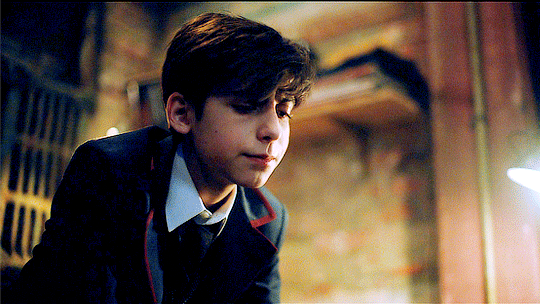
You and Five have a strong platonic bond, built on trust, mutual respect, and understanding
You often collaborate on missions, relying on each other’s skills and abilities to accomplish your goals
Despite your differences, you share a deep connection and enjoy each other’s company
You trusts Five enough to confide in him about personal matters, including the contents of your room
You bring Five to your room to show him something important you hid there for a mission
You are focused on finding the item, rummaging through your belongings with determination
Five follows you into the room, curious about what you’re hiding and eager to assist you
As you search for the hidden item, Five wanders around your room, taking in the surroundings
He notices the posters on your walls, getting a glimpse into your interests and personality
Five’s curiosity leads him to explore further, examining the items on your dresser and shelves
Among your belongings, Five spots a bottle of antidepressants on your dresser
He pauses, feeling a mix of surprise, concern, and curiosity about why you have them
Five wrestles with conflicting emotions, unsure of how to react to this unexpected discovery
Five struggles to reconcile the image of you as his capable friend with the reality of you needing antidepressants
He feels a pang of concern for your well-being, wondering if you’re going through a difficult time
Despite his initial shock, Five respects your privacy and doesn’t pry into your personal life without your consent
Five reminds himself that everyone has their struggles, and it’s not his place to judge or interfere
He silently supports you, recognizing that you may have your reasons for taking antidepressants
Five decides to focus on the mission at hand, trusting that you will confide in him if you need support
Throughout the mission, Five keeps a watchful eye on you, subtly checking in on your well-being
He offers his support in subtle ways, like being an attentive listener and providing encouragement when needed
Five makes a mental note to be there for you if you ever decides to open up about your struggles
The discovery of your antidepressants prompts Five to reflect on your friendship and his role as your friend and teammate
He realizes that there’s more to you than meets the eye and resolves to be more supportive and understanding
Five appreciates the trust you have placed in him and vows to be there for you, no matter what challenges you face
The incident strengthens the bond between you and Five, deepening your friendship and mutual respect
Five learns to appreciate the complexities of human emotions, realizing that vulnerability doesn’t diminish one’s strength
You and Five continue to work together as a team, facing missions with renewed determination and trust
You share a silent understanding that you can rely on each other, both on and off the field
Five feels privileged to have you as a friend and teammate, knowing that you’ll always have each other’s backs
You and Five make a pact to support each other through thick and thin, no matter what challenges you encounter
You understand that true friendship means accepting each other’s flaws and supporting one another through life’s ups and downs
Five’s discovery of your antidepressants serves as a reminder of the importance of empathy, compassion, and understanding in your friendship
Five respects your boundaries and doesn’t bring up the topic of antidepressants unless you choose to discuss it with him
He understands that some things are private and personal, and he doesn’t want to intrude on your privacy
Five trusts that you will reach out to him if you ever needs someone to talk to or lean on for support
You know that you can count on Five to be there for you, even during your darkest moments
Five makes a mental note to check in on you more often, making sure you know that he’s always there to lend an ear or a shoulder to lean on
Despite the initial shock of discovering your antidepressants, Five decides to approach the topic with sensitivity and openness
He subtly broaches the subject during a quiet moment, expressing his concern for your well-being and offering his support
Five assures you that he’s there for you, no matter what you’re going through, and encourages you to lean on him for support if you ever need it
Five gently suggests the idea of seeking professional help or talking to someone trained in mental health support
He emphasizes the importance of self-care and getting the help you need to navigate your emotions and struggles
Through your conversation, you and Five work together to normalize discussions around mental health and remove the stigma associated with seeking help
Five encourages you to build a support network of trusted friends and allies who can offer you additional support and perspective
He emphasizes the importance of surrounding oneself with people who uplift and support them, especially during challenging times
Through your shared experience, you and Five learn that vulnerability can be a source of strength and connection
You bond over your shared struggles and experiences, realizing that you’re stronger together than you are apart
The incident deepens yours and Five’s bond, fostering a sense of trust, understanding, and mutual respect between you two
You’re grateful to have Five by your side, knowing that he’ll always be there for you, no matter what obstacles you face
You and Five emerge from the experience with a renewed sense of purpose and commitment to supporting each other
Five feels grateful to have you in his life, knowing that you bring joy, laughter, and companionship to his world
#request#headcanons#the umbrella academy#five hargreeves#five hargreaves x you#five hargreaves x reader#five hargreeves x reader#five tua#tua five#number five x reader#five x reader#number five
140 notes
·
View notes
Text
Writing Loveless Characters
(Pt: Writing loveless characters)
Because I want to see more of them but non-loveless people often don’t have any idea where to start, or how to write them respectfully.
Loveless / heartless people are welcome to add their opinions! This is by no means a complete post, I'm just trying to give a starting point.
I’ll also discuss the decentering of love in stories a bit, even if there’s no explicitly loveless characters present. So if you’re interested in that, read on!
Definition
(Pt: Definition)
Let’s start with the simplest bit. What does it mean to be loveless (or heartless)?
Being loveless means not experiencing anything that could be described as love, feeling a disconnection from the entire concept of love, and/or it refers to the rejection of the idea that people need to experience love.
A lot of people who use the loveless/heartless labels are also neurodivergent and may feel a connection to this label because of that, but not all.
Being loveless can mean multiple things for one person, too. If you want to read more about the meaning of being loveless from a loveless person (me) you can read this post (link), or scroll a bit through the loveless aro and heartless aro tags.
What is love?
(Pt: What is love?)
Because we can’t go on without clearing up what this word actually means.
Love is just a label for an emotion. Nothing more. Love is not an action, actions are actions. Love is not a choice to care for some one, that is simply the choice to care for someone. This choice can be made completely without love, for example out of compassion, or because of a feeling of responsibility.
So, in short, "love" is just a label that a lot of people have decided to use for a specific emotion, and that label might not fit everyone.
Building a character
(Pt: Building a character)
For this, I can’t give a 100% conclusive answer, obviously, because all loveless people are different. Here’s just some things to keep in mind:
To respectfully write a loveless character, you should just throw out the idea that feeling love is necessary to be a good human, to care for other people or animals, or that not feeling love makes one immediately an asshole who doesn’t care for other people’s feelings.
Being loveless, in and off itself, says nothing about how a person acts. It only means that they don’t experience love (or any other part of the definitions above).
Things to avoid:
I can only think of two things you should definitely avoid doing, and that is connection lovelessness to being evil in any way, shape, or form. Also, avoid making your loveless character non-human if the rest of you cast is human (if all your characters are fantasy-races, that’s fine, probably just have a character, even just a minor one, of that same race who isn’t loveless, just to show that this isn’t a trait of this species that differentiates them from others, or make that very clear in the narrative.)
Yes, your loveless character can be evil, or morally complex, but you shouldn’t explain their villainy with them being loveless.
Yes, your loveless character can be emotionally distant, cold, or un-empathetic. Those words mostly describe me in some way. But again, you should decouple all of those things from being evil. Empathy doesn’t make a good human, and not experiencing empathy doesn’t make a bad person. Same with having shallow emotions.
But with all of this, you should still think about why you want to write them in this way. For example, do you want to write a loveless character with low empathy because you want to represent people like me, who are neurodivergent and don’t experience much empathy, and are also loveless? Or do you want to write them because those are things that make them more unlikable, or show their villainy?
Do you want them to experience shallow emotions to represent people who feel that way, or to explain away their lovelessness with "no normal person would feel this way"?
Do you want to write a loveless villain because it makes them more complex, and allows you to explore their emotions to a deeper level, or because you equate not feeling love with being evil and being evil with not feeling love?
Because there’s a very big difference, and your intentions matter a lot here, because the way you think about your character influences the way you write them.
Things I’d like to see / ideas to include
Besides "really, any loveless person who isn’t demonised" ofc.
- characters being open about not experiencing love, and not being judged or "fixed" for it.
- The narrative not treating lovelessness as a bad thing, and other characters just simply respecting their boundaries.
- A character with boundaries around the word love in general, doesn’t have to be loveless, and them being respected. Some people just don’t like hearing "I love you"s all the time.
- Just generally decentering love from the narrative (see more below)
- ND loveless people who fit the "bad stereotypes", turning them on their head (like me, hi.)
- not repeating respectability politics ("I might not feel love but I still care for people, I’m just like you!") This is not to say that loveless people don’t care for other people, just that it shouldn’t be shoe-horned in as a way of "showing that they’re still a good human being, despite not feeling love". They can just care for other people normally, without making it seem like something special or strange because they don’t feel love.
Questions to ask
To get a better understanding of your character:
- Why does this character identify as loveless, or could be identified as loveless? What does it mean to them, personally?
- How does being loveless affect their relationships?
- How does being loveless affect their view of the world, and other people?
- How important is their lovelessness to them? Is it something they’re proud of and show openly, or just something that’s a part of them that comes up when it gets important, but is otherwise just "background noise" for them?
- How do they feel about being the "target" of different kinds of love? Does love in general make them uncomfortable, just specific kinds, or do they not mind other people’s feelings towards them?
- Adding to the point above: Do the other characters respect their boundaries? If not, why? Does it add something important to the story?
That’s the most important points I can think of rn.
Decentering love
(Pt: decentering love)
Even if you don’t have a specific loveless character, this can still be done and often times make for some more interesting stories and characters that mostly haven’t been told before.
What do I mean by that?
Well, first off all, almost everything in most modern books is about love, contains love, or centers love in some way. There’s barely any new books coming out that don’t put the main characters in romantic relationships, even if they’re not in the romance genre, and if they don’t, these books are usually about the importance of platonic (or familial) love instead.
Im not saying these books shouldn’t exist. What I mean is that not everything has to center around love when there’s so many more emotions and experiences that could be written about, but instead we have millions of books that basically have the moral "You’re only worthy of humanity in the context of you relationships to other people, your only importance comes from finding people who love you / who you love, or character finds happiness through love (either their ~one true romantic love~ or platonic love)", because they obviously couldn’t learn to be happy with themselves, or that they didn’t need to center other people in their life constantly, or that they can be a complete and happy human on their own, too.
People can exist without basing their whole self worth on other people’s emotions towards them, and their emotions to other people.
To decenter love, you need to take the concepts, and ask "Why?" Why does this character need to be taught to accept themselves by falling in love? Why does this character need love to be happy, why can’t they just be happy as they are? Why should not loving make their life miserable, and why is the only way to fix it to find love, possibly even change themselves to finally be accepted by other people, instead of accepting themselves as they are, and finding community, if that’s important to them, as that?
You can even write about human connection without centering love, or about love without centering it, and portraying love as this universal, perfect good thing that makes us human and that everyone experiences. That is completely possible!
It can be just simply making sure that the narrative makes clear that this is these characters experience, and not a universal one. That there’s people who don’t feel this way. People who don’t love, don’t need love, and feel happy as they are, without relying on other people to make them happy.
Decentering love can also be about finding other ways to explore human connection. Relationship that are deep and emotional, but the characters don’t use the word love do define it; characters who are looking for community, for support, and giving community and support to others even if they don’t love them, maybe just because it’s the right thing to do, or because it’s the way they’d want to be treated, or because they have a deep seated care for humanity as a whole that they don’t describe as love.
There’s so many more emotions, so many more types of relationships, that deserve to be explored. Don’t limit yourself to just love and romance, or just (queer)platonic relationships as an aspec writer. You can write about sexual relationships, or about completely non-typical relationships that don’t really have a good term to describe them.
Write about relationships based on compassion, on sexual attraction, on mutual interest in the same topic, on what ever other emotion you can think off. I’ve once read a fantasy book where two off the main characters were different species, and mostly interested in each other to find out more about these species, and that was interesting; wonderfully written and it’d be awesome to have something that focussed on such an absolutely non-normative bond.
Don’t limit yourself to just "love", to just what society has put on a pedestal as the best and solely most important thing that connects everything and everyone. Think of all the other things that exist. Be creative.
Have fun creating!
(pt: Have fun creating!)
If you have any questions, feel free to ask me.
Thank you for reading this. Have a good day, and happy writing!
#aromantic#aro#aromantic rep#loveless#loveless aro#heartess#heartless aro#amatonormativity#writing#writing advise#writeblr
73 notes
·
View notes